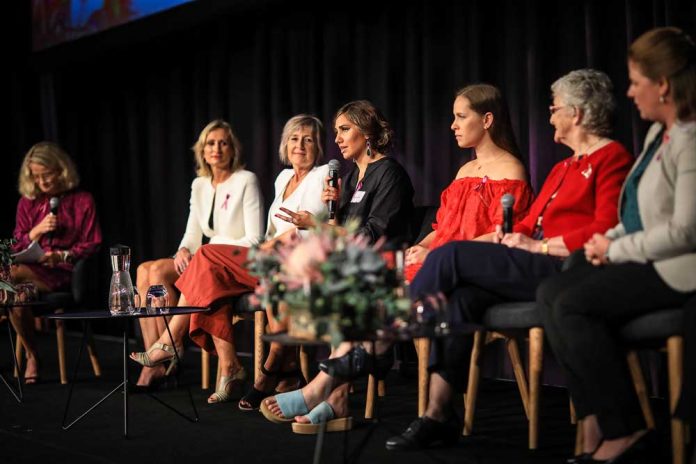Kirli Saunders was recently selected as NSW Aboriginal Woman of the Year for her work in Poetry in First Languages with Red Room Poetry in Zetland. In this Q&A she talks about her groundbreaking work and award-winning writing.
You were recently chosen as the NSW Aboriginal Woman of the Year. How does it feel?
I was surprised and delighted to receive this award, I have so much respect for my fellow finalists, Pauline Clague and Ngiare Brown and for all of the finalists recognised in the different categories of NSW Woman of The Year. This award wouldn’t be possible without the other incredible women I have around me, supporting my work in community, writing, and for my project, Poetry in First Languages at Red Room Poetry.
Your award nomination and selection stems from your work through Poetry in First Languages work you do with Red Room Poetry in Zetland. Tell us about it.
Delivered by Red Room Poetry, Poetry in First Languages celebrates, shares and preserves knowledge of First Nations languages and culture through poetry, music, dance and art. Poetry in First Languages aims to support students to find strength in their cultural identities through language learning and connecting to Country, culture and community with the intention of enhancing overall wellbeing and knowledge.
Why is this work so important?
Our nation’s history has strongly impacted the way that cultural knowledge and languages are shared with First Nations children and Young People. Poetry in First Languages supports students to learn from community on Country through a range of tailored learning experiences. Our Bailey and Yang report in 2018 found that for 95 per cent of participants involved, this was their first language-learning opportunity. Anecdotally, I see a lot of students benefit from the program, showing more confidence with self-expression and in regards to cultural identity.
In 2020, Poetry in First Languages was to focus on the south east of NSW and was to be delivered with Gundungurra, Dharawal, Gumea Dharawal, Yuin, and Jerrinja Communities in early childhood, primary and secondary settings. What positives were you aiming for?
In previous years we’ve delivered Poetry in First Languages in NT, NSW and ACT. This more centralised focus around the south east Coast of NSW is where we’ve partnered with NSW Department of Planning, Industry and Environment to support their conservation projects for the glossy black cockatoo, brush-tailed rock wallaby and the coastal ICOLL management of Wallaga Lake. Students will have the opportunity to learn about care for Country with Community, while conserving language through poetic responses to their “On Country” days.
Working with Early Childhood centres allows us to reach our young ones earlier, preparing them with the enhanced educational outcomes that accompany enhanced wellbeing as a result of being connected to Country, language, culture and community through poetry in First Languages.
These are also communities to which I have strong ties, geographically and through my Grandmother’s line, and I can’t wait to learn more Dhurga with Aunty Vicki Parsley and Aunty Loretta Parsley on Yuin Country.
If Covid-19 is impacting upon the roll out what will this mean?
While we really value caring for our community, and especially our Elders – our face to face programs have been impacted by Covid. As a result, we’re exploring the digital delivery of our language programs, so that all students can learn First Nations languages from the comfort of their school or home and respond through the creative arts.
How did you learn Gundungurra language – and what do you love about the language? What is your favourite word and why?
I was born and raised on Gundungurra Country around the Southern Highlands. Aunty Val Mulcahy, Aunty Sharyn Halls and Aunty Trish Levett have all taught me Gundungurra, they’ve also made me responsible for sharing dance, language and cultural knowledge with our young ones. I love that the language is poetic and melodic. My favourite word is Ngununggula [nah-gun-ah-goo-lah] it means walking and working together. It’s also the name of our women’s dance group, headed up by Aunty Trish, Aunty Sharyn and Mel Wiya, it welcomes First Nations dancers from a range of communities, who have ties to Gundungurra lands to walk and work with us in dance.
How can people support Poetry in First Languages and/or Red Room Poetry?
Check out the Red Room Poetry website, Facebook and Instagram. You can also volunteer your time and contribute financially to the ongoing development and delivery of Poetry in First Languages. Listen to my interview with Tiddas4Tiddas and Racematters on your favourite podcast app too!
You are a much-acclaimed children’s author, poet, author and playwright. What’s coming up and what have you achieved?
At the moment I’m working on Yana in the Bawa, a preschool aged picture book to be released in 2021 (Magabala Books), and Our Dreaming (Scholastic). I’m also working towards a visual poetry exhibition with Verb Syndicate Gallery in Wollongong (November 19 to December 2) with thanks to Australia Council. My recent poetry collection, Kindred, was well received, and The Incredible Freedom Machines was a notable picture book in the Children’s Book Council of Australia awards in 2019. It was also shortlisted that same year for the Prime Minister’s Literary Awards. I was also pleased to be awarded the inaugural Daisy Utemorrah Award in July 2019 for my rhythmic junior verse-novel, Bindi, which will be published by Magabala Books in August 2020.





